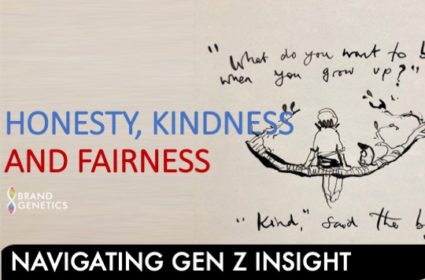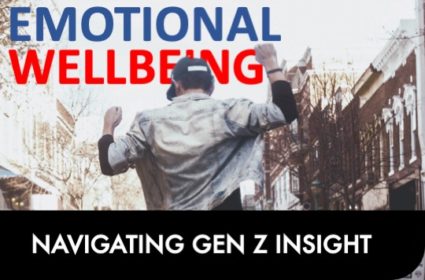Beyond Fake News – Navigating Gen Z insight

This article is part of our series on Navigating Gen Z Insight. You can view the full series or download the report.
Download ReportWhat do you know about the cohort of 2 billion teens, tweens and young adults born between 1997 and 2012?
The answer is probably less than you thought. A quick dose of fact-checking reveals many Gen Z claims you may have seen published to be little more than “fake news” with little or no basis in fact – a big problem for brands who are trying to make smart decisions.
Take, for example, the claim that Gen Z is less materialistic than previous generations. In reality, robust data where it exists, such as in the US, reveals little supporting evidence for this statement. On the contrary, data reveals a cohort more likely to value material wealth than Millennials, and less likely to value the pursuit of a meaningful life. As generational psychologist Dr. Jean Twenge concludes, for Gen Z ‘money is in, and meaning is out’.
Other “alternative facts” include the ideas that Gen Z is more optimistic (fact – they are more likely to be depressed and anxious), more entrepreneurial (fact – they are less likely to want to work for themselves) and more self-reliant (fact – they are more likely to live with their parents longer, and more likely to be economically dependent).
However, perhaps the biggest dose of fake news is the idea that there is cookie-cutter uniformity for this cohort around the world. On the contrary, data reveals as much diversity within Gen Z as exists between generations. This is a generation that defies stereotyping!
Want to build your Gen Z strategy on proven insights rather than fake news? Based on Brand Genetics systematic review of the evidence, our short report highlights three core Gen Z insights, relevant for brand teams, that are supported by robust data.
How to spot Gen Z fake news when you see it
1. Small local samples with narrow methodologies
One sure sign of fake news is a sweeping claim made from a small localised sample. Similarly, look for claims justified by a qualitative investigation. Qualitative research can be exceptionally powerful at revealing insights and illustrating distinctive Gen Z traits, the why behind the what, although it cannot validate whether these traits are truly generationally relevant.
2. Compared to what?
In addition, be wary of the absence of comparative data contrasting Gen Z with others. For example, some generational studies involve deep dives into Gen Z, and only Gen Z. These studies can help illustrate what is known about Gen Z, but they can’t identify new news because of the confounding variables of context, circumstance or convention (period effects).
3. Snapshot survey
Another common trap is snapshot surveys comparing Gen Z with older Millennials (or younger Gen Alpha). The problem here is that this research may simply be telling us that younger people think and behave differently to older people. To identify true generational traits, robust research using time-series data to compare Gen Z today with age-matched previous generations is vital!
4. Validated scales
Last but not least, watch out for research which is purely based on self-reports and opinion polls that are subject to social desirability bias (presenting oneself in a false, but favourable way). To avoid this, strong generational research uses behavioural data and data from validated psychological scales.
Want to know the facts? Our short report highlights three core Gen Z insights you can be confident in, relevant for brand managers, that are supported by robust data.
If you’re looking to move beyond fake news and properly understand what makes Gen Z tick, get in touch – we would love to hear from you




